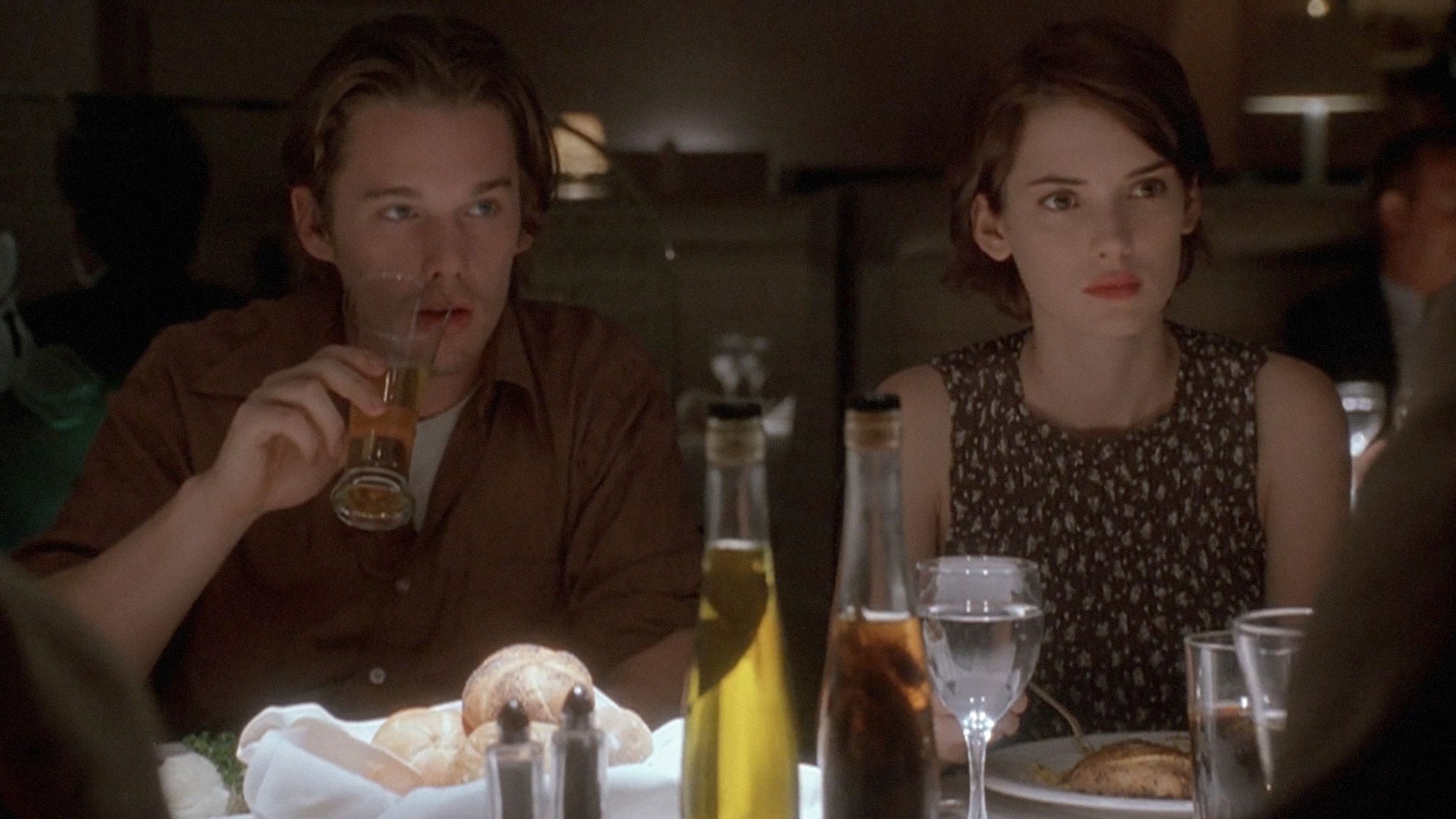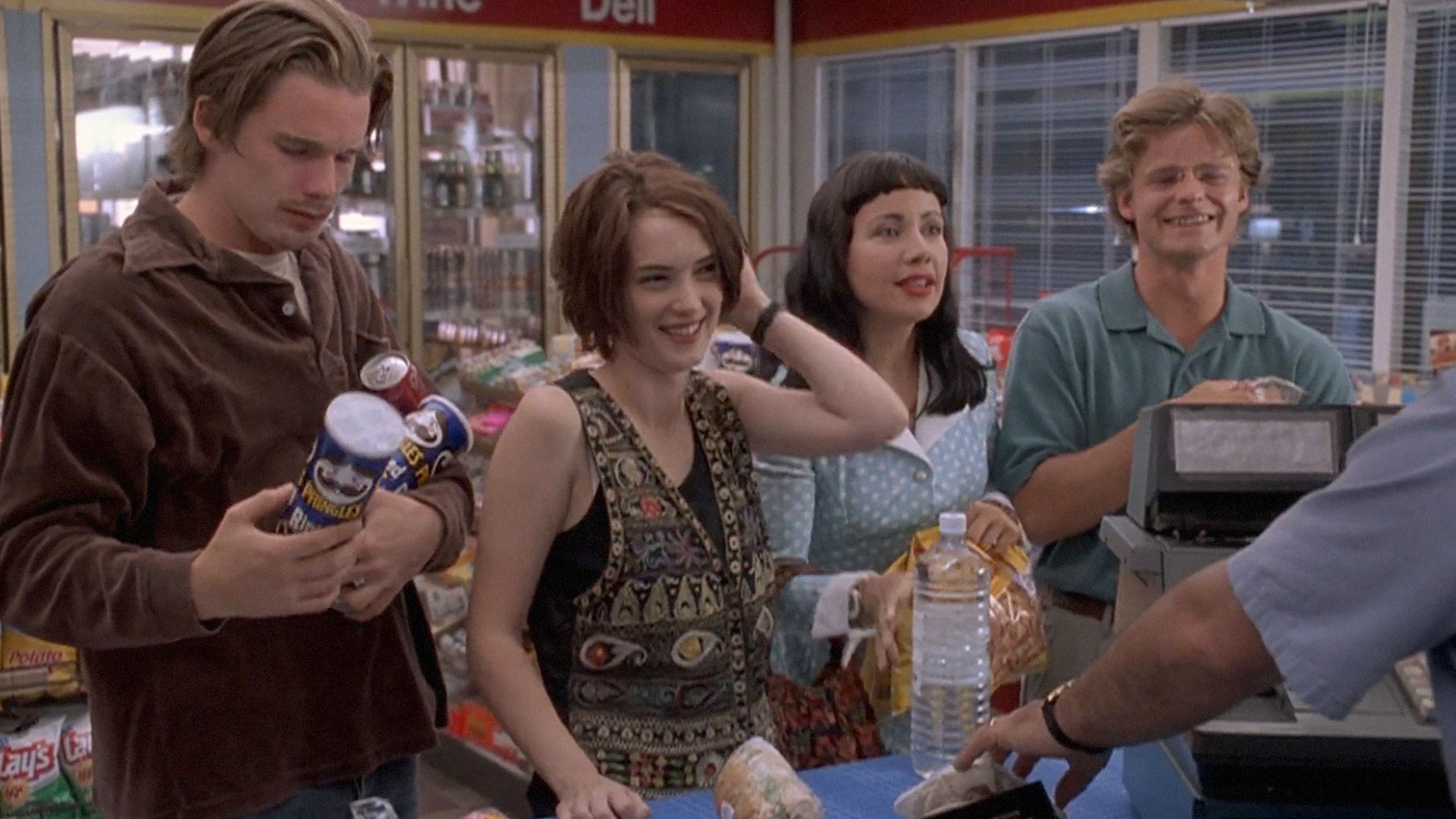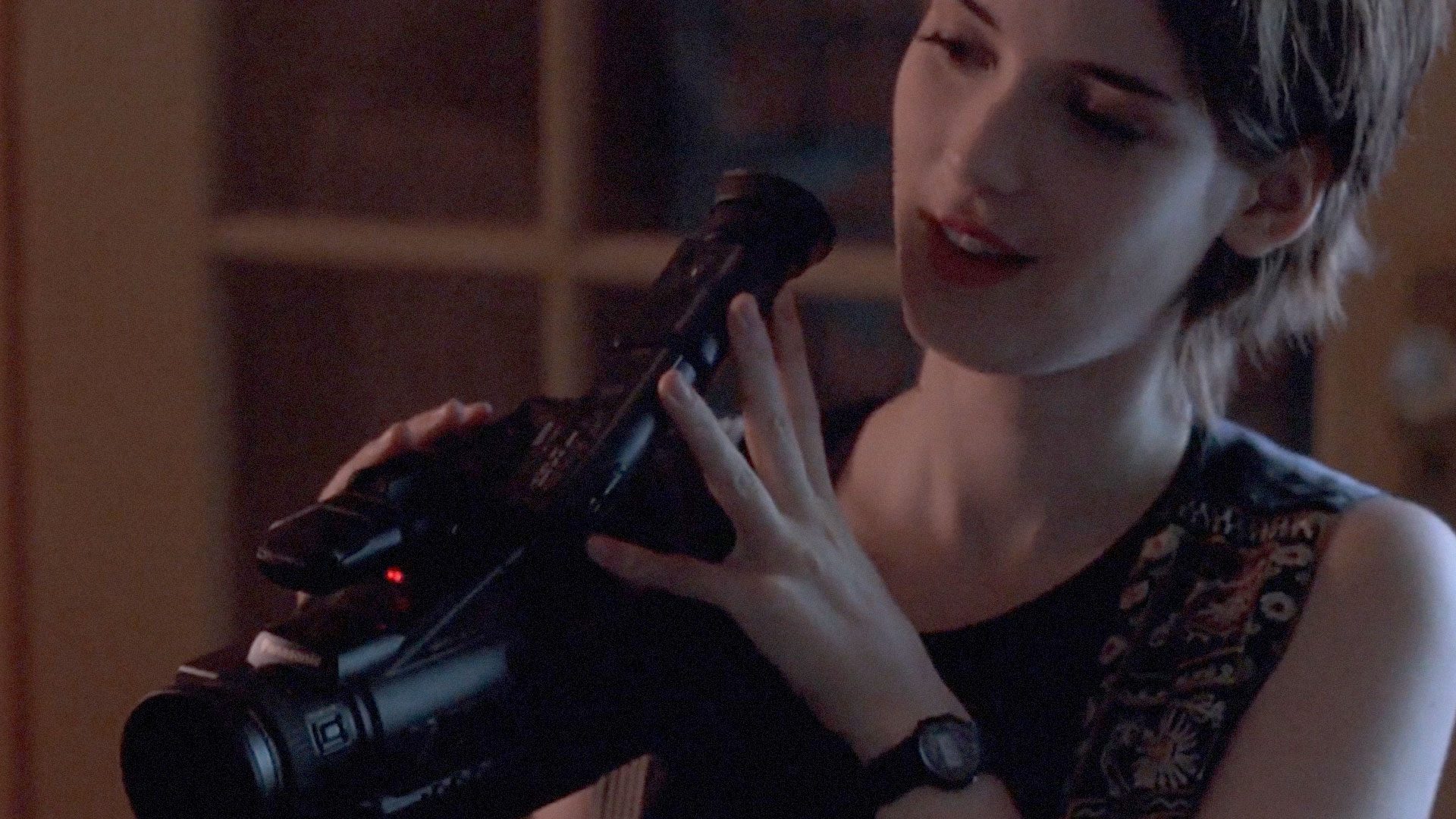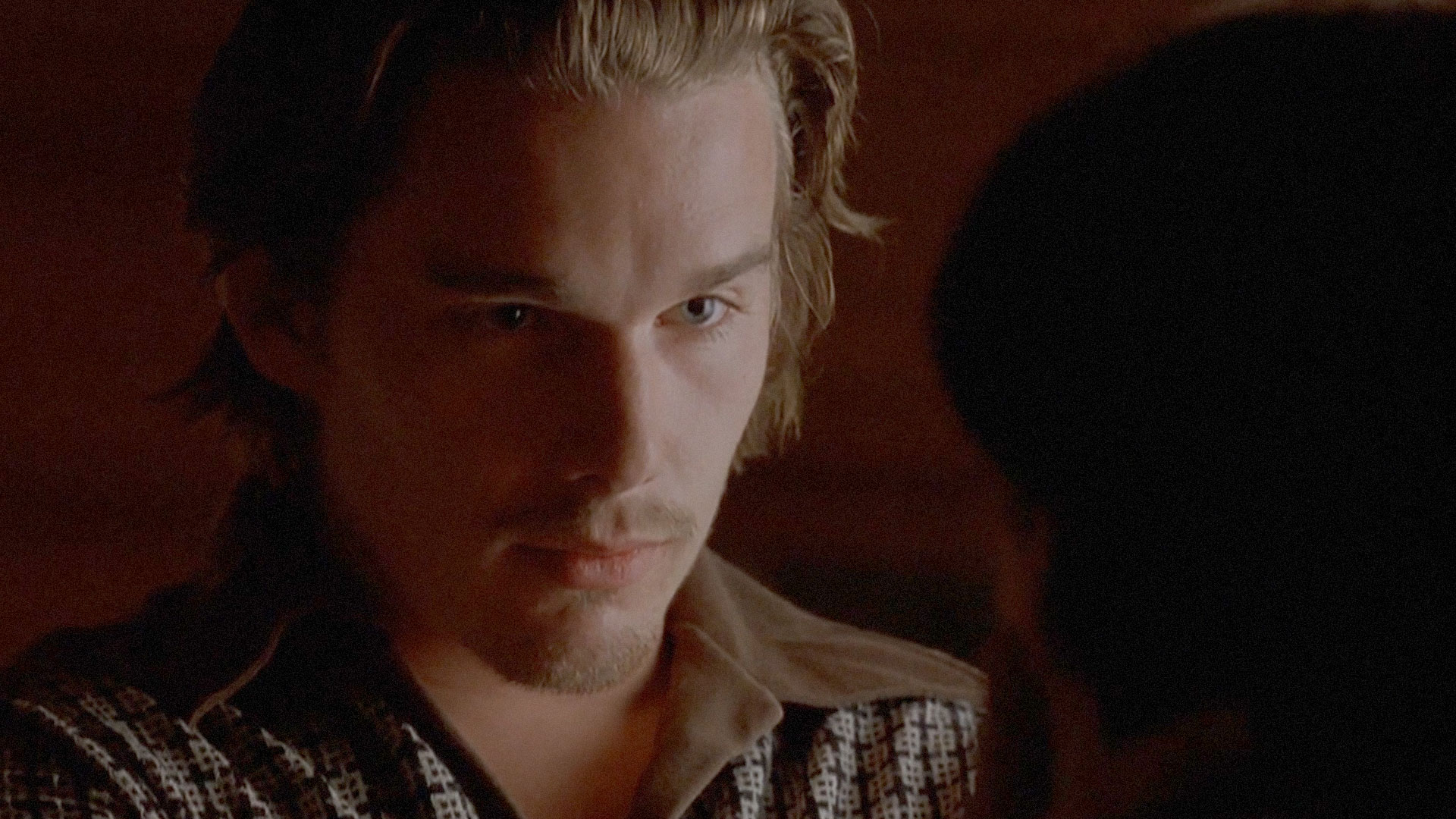I was around eleven years old when Reality Bites was released back in 1994, and at that time, it was my favorite movie. I loved the quips and the anti-establishment attitude, and I thought that the stars at its heart, Winona Ryder as low-key hot mess Lelaina, Ethan Hawke as incorrigible dirtbag Troy, Janeane Garofalo as cynical and hilarious Vickie, and Steve Zahn as sweet, sweet Sammy, were the very height of hip. I didn’t get a lot of the references — and Reality Bites is nothing if packed with references, from junk-food ingredients to 70s sitcom plotlines — but I got the vibe. Directed by a twenty-eight-year-old Ben Stiller, who also stars, it follows four friends trying to navigate post-college life and love in Houston, while Lelaina (the valedictorian) videotapes their antics for a documentary. Stiller plays the well-meaning “yuppie” and media guy who falls for her, which creates tension in her clique, especially with Troy.
The slacker-chic quipsters of Generation X may have been my mentors through movies and other media (My So-Called Life, anyone?) through my tween years, but do these now-vintage cultural touchstones still have anything to offer? I re-watched Reality Bites for the first time since middle school in an attempt to sleuth out and dredge up any remaining relevance, and the result (in the parlance of our clickbait-y times) may surprise you. Here’s what I learned:
Some Things Never Change
Watching Reality Bites again, I was struck by how much of the rhetoric espoused by various “adults” sounded similar to lines that have been used to label my generation. The accusations of arrogance, or a lack of work ethic, or of the dismissal of “values” echo the critiques levied on millennials — complaints so rote that they’ve become punch lines in and of themselves. At one point Lelaina’s boss, the two-faced host of a local morning talk show, threatens to replace her with an unpaid intern.
Fast-forward to today, and that job almost certainly is being done by a said intern, or by a contract employee. With the recession and the housing market’s collapse, one could argue that today’s generation finds themselves even more adrift than their Gen X counterparts — and while the characters in Reality Bites are in their early 20s, they’re facing a lot of the struggles that millennials are still grappling with well into their 30s and beyond. Which reminds me: Does Dominoes still take checks?
Representation is a Double-Edged Sword
Vickie, a wise-cracking, disco-obsessed manager at The Gap, is terrified about the impending results of her HIV test (which, apparently took a couple of weeks to process back in those days, a wait that would make my hair turn prematurely grey as well). In a diner, she confesses, “It’s like it’s not even happening to me. It’s like I’m watching it on some crappy show like Melrose Place or some sh*t, right? And I’m a new character, I’m the HIV-AIDS character, and I live in the building and I teach everybody that it’s okay to be near me, it’s okay to talk to me, and then I die. And there’s everybody at my funeral wearing halter tops or chokers.”
Revelations about the cyclical nature of fashion aside, I was struck with how this part of Helen Childress’ script hits the nail on the head in terms of representation, and what it means to be tokenized or typecast. Replace “HIV-AIDS” with trans, non-binary, immigrant, refugee, Muslim — basically any currently hyper-marginalized identity — and this rant is still painfully relevant. Why are we obsessed with death as a shortcut to empathy? Why do these kinds of characters always need to die, and why is their value always in what they can “teach” other characters… and the audience?
“Don’t Bogart That Can, Man.”
Okay, so this classic Vickie line is ostensibly a joke about cannabis consumption, but seriously: When Troy gets fired from his newsstand job for “stealing” snickers, he finds himself in need of a place to stay. Lelaina and Vickie take him in, but not without a lot, and I mean a lot, of vocal protest on Lelaina’s part. Then she suddenly finds herself in the same position, and lo and behold, she begins exhibiting a lot of the same behavior that she once criticized and mocked in her friend — turning down job opportunities, sitting in front of the TV all day, and turning the apartment into a “den of slack,” as she so charmingly puts it. The lesson here is that times are tough, and the future is tenuous and murky, so be kind and generous with your friends. They deserve it, and besides, the tables could always turn. Don’t mistake your privilege for something more righteous and virtuous.
So Wait… DON’T Commodify Your Entire Life?
What Lelaina is trying to do with her documentary looks an awful lot like what we’re all doing on Instagram and Snapchat today; just replace the bulky camcorder with a phone camera and the Schoolhouse Rock sing-a-longs with… I don’t know, Lil Uzi Vert? Instead of working in TV, today Michael would be a tech bro trying to launch some kind of new “content platform.” But Lelaina doesn’t want to make “content.” Yeah. I was confused, too.
In just twenty-five short years, the opportunities and pressures to record, share, and monetize our personal lives have become ubiquitous, looming, and consuming. Lelaina’s reticence, in light of this, to let a TV show make her and her friends into Gen X “influencers,” feels like some kind of radical modesty. But it’s an important reminder that in an age where it’s practically demanded of us to perform our politics, our rituals, our self-empowerment, and our recovery online, there’s something to be said for that kind of modesty.
The Flags are Red. Red!
If Reality Bites had been made today, Lelaina would have rejected both of her suitors and ended up alone, possibly starting over in a new city, Ghost World-style. Probably the biggest disappointment of this movie is its insistence on making Lelaina and Troy’s romantic storyline happen when it’s pretty clear that their dynamic is about as healthy as those Super Big Gulps Lelaina loves so much. I’m angry that this movie packaged a borderline abuser as a hot, complicated intellectual. Frankly, I don’t think what I internalized served me very well.
Let me be clear: If you find yourself falling for someone like Troy, who is scornful when you’re happy and amorous when you’re hitting rock bottom, who shames you in public and manipulates your emotions, and who says things like “You can’t navigate me. I may do mean things, and I may hurt you, and I may run away without your permission, and you may hate me forever” and oh, yeah, also doesn’t know how to apologize… just run. It doesn’t hurt because it’s real, it hurts because they’re a jerk who brings out the worst in you. The purity and strength of your love will not change them. Say what you will about the earnest, Peter Frampton-loving Michael being a clueless corporate sellout, but at least he’s nice and supportive. I know, I know. What a high bar.
Watch Now: There’s no denying that Ethan Hawke has aged well! Catch him in The Woman in the Fifth, available for streaming 24/7, and Hamlet, available through November 30, on Fandor.









